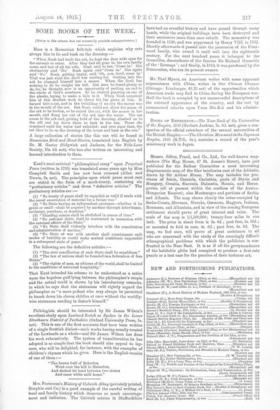Kant's semi-satirical "philosophical essay" upon Perpetual Peace (written in 1795)
was translated some years ago by Miss Campbell Smith and has now been reissued (Allen and Unwin, 2s. net). The principles upon which peace must rest are stated in the form of a. mock-treaty, containing six "preliminary articles" and three "definitive articles." The preliminary articles- are (1) "No treaty of peace shall be regarded as valid if made with the secret reservation of material for a future war."
(2) "No State having an independent existence—whether it be great or small—shall be acquired by another through inheritance, exchange, purchase, or donation." , (3) "Standing armies shall be abolished in course of time." (4) "No national debts' shall be contracted in connexion with the external affairs of the State."
(5) "No State shall violently interfere with the constitution and administration of another."
(6) "No State at war with another shall countenance such modes of hostility as would make mutual confidence impossible in a subsequent state of peace."
The following are the definitive articles :— (1) "The civil constitution of each State shall be republican." (2) "The law of nations shall be founded on a federation of free States."
(3) "The rights of men, as citizens of the world, shall be limited to the conditions of universal hospitality."
That Kant intended his scheme to be understood as a satire upon the hopeless gulf lying between the philosopher's utopia and the actual world is shown by his introductory remarks, in which lie says that the statesman will rightly regard the philosopher as "a mere pedant who may always be permitted to knock down his eleven skittles at once without the worldly- wise statesman needing to disturb himself,"


































 Previous page
Previous page